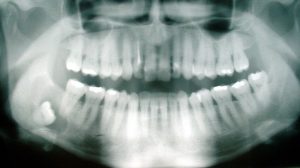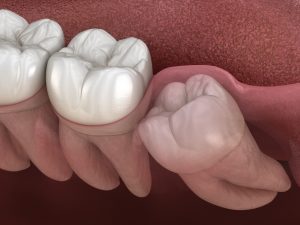How Long Does It Take Your Wisdom Teeth to Come in
In order to seek a timely treatment for impacted wisdom teeth, it is important to understand what are wisdom teeth and what are the signs of wisdom teeth coming in that you should be concerned about.
Wisdom Teeth Coming In: What You Need to Know
Did you know that wisdom teeth are the last remaining permanent teeth to emerge in your mouth? These can begin to erupt usually anytime around the age of 18, but can also remain dormant and may never appear. And for some people, they can grow in perfectly fine, adding four more molars to complete their adult teeth.
However, wisdom teeth can also create some dental complications under the gumline. This can lead to infections and a slew of other health-related issues. In these cases, surgical extraction of wisdom teeth is usually necessary. But, how can you tell when yours are emerging and whether future extraction is needed?
If your wisdom teeth are in the process of growing, you may have many questions, such as:
- How do you know if your wisdom teeth are coming in?
- Why are wisdom teeth painful?
- Are wisdom teeth even necessary?
In this article, we will answer those questions to help you go through the process of your wisdom teeth coming in as smoothly as possible.
Why Do We Have Wisdom Teeth?
 In general, wisdom teeth serve no specific purpose, other than being an additional pair of molars on each side of the mouth to aid in grinding food. However, due to their late eruption (usually between the ages of 17 and 24), these four additional teeth can become problematic in case they don't have enough room to emerge.
In general, wisdom teeth serve no specific purpose, other than being an additional pair of molars on each side of the mouth to aid in grinding food. However, due to their late eruption (usually between the ages of 17 and 24), these four additional teeth can become problematic in case they don't have enough room to emerge.
According to scientific research, vitamin K2, which is responsible for the development and the growth of the jaw, is often lacking in modern diets. As a result, the underdevelopment of the jaw is common among the modern population, which is one of the reasons why wisdom teeth do not have enough space to emerge.
In addition, there are other possible causes for the underdeveloped jaw, such as decreased rates of breastfeeding and a soft-food-based human diet in infant age.
Wisdom Teeth Symptoms: First Signs Your Wisdom Teeth Are Coming In
When inspecting your mouth for signs of wisdom teeth comping in, pay attention to these dental health symptoms:
- Bleeding or tender gums
- Swelling of the gums or the jaw
- Jaw pain
- An unpleasant taste in the mouth or foul mouth odor
- Difficulty opening your mouth
Tender and Swollen Gum Tissue
One of the first signs of your wisdom teeth coming in is when you experience any tenderness or discomfort around the back of your mouth. This can be on either side or just one. If you can imagine the sensation of adult teething, this would be an accurate idea of what you would feel. You may also notice swollen gums.
Triggered Headaches
If your wisdom tooth does become trapped under the gums, this can lead to a build-up of pressure, which can trigger headaches. This can be a difficult sign to detect if you already suffer from frequent headaches. So always ensure you continue to attend your regular check-ups with a skilled dentist so they can monitor the condition of your oral health.
Infection In The Gums
As a wisdom tooth begins to erupt, wisdom teeth roots can often be awkwardly positioned, which causes only part of the tooth to emerge. When this happens, it can leave the gum tissue very susceptible to active infections. Even with a minuscule opening, food can easily get lodged in there, making it very difficult to remove, even with thorough brushing and flossing. This can escalate into a potentially serious infection known as pericoronitis if not detected and corrected immediately. This is the most serious sign to look out for when your wisdom teeth are coming in, so always consult with your dentist as soon as possible.
Why Wisdom Teeth Cause Pain
 In general, the pain and discomfort associated with wisdom teeth coming in is due to several factors:
In general, the pain and discomfort associated with wisdom teeth coming in is due to several factors:
- Impaction. In some cases, the emerging wisdom tooth simply does not have enough space to erupt completely. As a result, the tooth may be placed at odd angles, creating constant pressure against neighboring teeth. This is when the wisdom tooth is considered to be "impacted".
- Partial eruption. In case the tooth is erupted only partially, the bacteria can enter under the gum, causing an infection and stiffness, swelling, and pain. This is the most common cause of wisdom teeth pain.
- Tumours or cysts. An impacted wisdom tooth can lead to tumours or cysts, which can later lead to the destruction of other healthy teeth and the jawbone if not treated in a timely manner.
When Wisdom Teeth Need to be Removed
Wisdom teeth are the final set of your 32 teeth to push through the gums. If their placement is good and the alignment is correct, they are not likely to cause any issues. In this case, a wisdom tooth does not need to be removed.
Nevertheless, often, wisdom tooth begins to come in sideways. In case of the lack of space, it can remain trapped under the gum line, disrupting the alignment of other teeth. This wisdom tooth is "impacted" and may develop cysts or tumours, which can destroy the jaw bone and cause tooth decay if left untreated.
Finally, if a wisdom tooth only partially emerges, it can make oral hygiene more difficult. Such teeth can allow bacteria to enter the gums, resulting in an oral infection that causes stiffness, pain and swelling, as well as bad breath.
Not surprisingly, many dentists in Ottawa recommend getting the wisdom tooth removed if they see the potential for these dental problems.
Wisdom Tooth Pain Relief
While you are waiting for your wisdom tooth removal surgery, there are a few things you can do to relieve tooth pain at home. Here are some tips on how to get rid of toothache:
-
 Apply a cold compress. Applying a cold compress to the side of your face for 20 minutes can help reduce the inflammation and associated pain.
Apply a cold compress. Applying a cold compress to the side of your face for 20 minutes can help reduce the inflammation and associated pain. - Use a hot pack. Alternatively, you could apply a hot pack or compress to the side of your face. The heat from the compress will temporarily relieve the pain. If you do not have a hot pack at home, you can make one by filling a sock with rice and tying it. Then, place the sock in the microwave to warm it up.
- Take an anti-inflammatory. You can blunt pain signals by taking over-the-counter anti-inflammatory medications, such as ibuprofen. Continue taking the medication every few hours, as shown on the label, or the inflammation is likely to return. You could also take acetaminophen instead. However, acetaminophen would only help with pain management, but it does not have anti-inflammatory properties.
- Rinse with salt water. Salt water rinse is a simple and natural way to get rid of tooth pain. Rinsing your mouth with warm salt water can promote temporary pain relief and clean bacterial infections, as well as heal any oral wounds. Just make sure not to swallow any salt water while rinsing.
- Use peppermint tea bags. Peppermint possesses mild natural numbing properties that temporarily reduce oral pain. Most people find it useful to cool the tea bags in the freezer before using it. You could also apply the tea bag while it is still warm and wait for it to cool.
Suffering from Wisdom Teeth Pain? Contact Rockcliffe Dental Today!
Any of the mentioned signs are good indications that it's time to schedule a check-up with a dental clinic in Ottawa to see whether you require a wisdom tooth extraction. Practicing good oral hygiene and applying ice packs may temporarily relieve the pain, but ignoring the symptoms of wisdom teeth will only create serious potential health implications for you.
So give us a call at Rockcliffe Dental to set up your next appointment and receive proper treatment. Our team of dental professionals will be happy to provide proper oral health care for you.
- Learn more about wisdom teeth removal in Ottawa
- Learn more about emergency dentist in Ottawa for wisdom teeth removal
How Long Does It Take Your Wisdom Teeth to Come in
Source: https://familydentistottawa.com/signs-your-wisdom-teeth-are-coming-in/
0 Response to "How Long Does It Take Your Wisdom Teeth to Come in"
Post a Comment